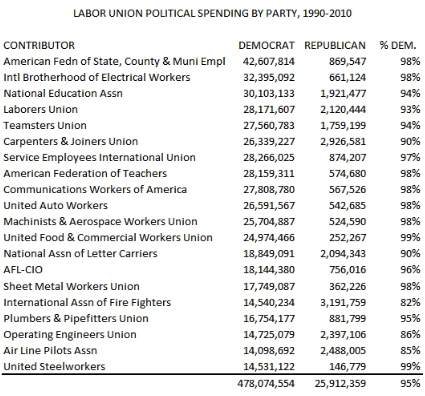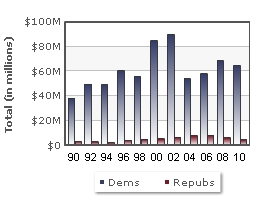Is Union Reform Partisan?
Advocates of public sector union reform have long been accused of playing partisan politics, but the data suggests it is the unions, not the reformers, who are political partisans. According to OpenSecrets.org, a nonpartisan, independent and nonprofit research group tracking money in U.S. politics, just the top 20 labor unions over the past 20 years have spent over $500 million on federal election campaigns, and 95% of that spending went to Democrats.
This data is compiled by OpenSecrets.org on their webpage “Labor: Long-Term Contribution Trends.” On the chart below the blue bars represent labor union contributions to Democrats, and the red bars represent labor union contributions to Republicans. They show the total reported political contributions for the last eleven two-year election cycles through 2010. The red bars are scarcely visible.
The next table, which extracts data from the OpenSecrets webpage “Heavy Hitters: Top All Time Donors” (below) shows the top 20 labor union’s political contributions to each party for the same 22 year period. Among most of the major labor unions, the contributions are nearly 100% to Democrats. Overall, 95% of political contributions by labor unions have gone to Democrats, and only 5% to Republicans.

One can argue as to whether or not the agenda and policies of Democrats and Republicans are the cause or the effect of political contributions. But there can be no doubt that the overwhelming preference of organized labor is to contribute to Democrats. Their agenda, as reflected in their political giving, is explicitly partisan.
Because unions are, presumably, grassroots organizations supported by their members, the extent to which unions practice partisan politics becomes a regulatory issue. After all, unless literally 95% of union memberships are comprised of registered Democrats, how can unions, who purport to represent their members, justify allocating 95% of their political spending to Democrats? Could it be because unions are not grassroots organizations, but instead are special interests who have managed to carve out a unique niche in American politics? Should unions have the right to demand an employer fire any employee who doesn’t want to join their ranks? In 28 states, that is the law. Should unions be able to use membership dues in any manner they wish, even if they contribute the money to politicians and causes that are not representative of their memberships?
With public sector unions, the unique ability of unions to compel membership and compel political contributions is compounded because their partisanship violates the principle that government organizations should be politically neutral. Is it appropriate for government workers who police us, protect us, regulate us, rescue us, care for us, and teach our children, to also tell us how to vote? Is it appropriate for public sector unions to spend overwhelming amounts of money on political campaigns to elect the people who they will then negotiate with for pay and benefits? Should public sector unions even be allowed to exist, much less involve themselves in politics, if the government entity they bargain with can simply raise taxes to cover the costs of their negotiated increases to pay, benefits, and headcount? Because in the private sector, at least union negotiators know that if their demands become too costly, the company will go out of business.
It is not partisan to ask these questions when the unions, especially public sector unions, engage in partisan politics. They do this often in defiance of their members own political preferences. In the case of public sector unions, their partisan politics violates the ideal of a politically neutral government workforce, and is not subject to the discipline of the market. It is not partisan to explore reforms that may address these issues.

Edward Ring is a contributing editor and senior fellow with the California Policy Center, which he co-founded in 2013 and served as its first president. He is also a senior fellow with the Center for American Greatness, and a regular contributor to the California Globe. His work has appeared in the Los Angeles Times, the Wall Street Journal, the Economist, Forbes, and other media outlets.
To help support more content and policy analysis like this, please click here.


Corporations outspend unions 19 to 1.
Charles,
I don’t know where you’re getting the figure of 19-1. Can you provide a source? In any event, corporate spending is not partisan. Corporate spending is roughly 50/50 Democrats vs. Republicans.
You ask Charles where he is getting a 19-1 figure, I would have to ask where you are getting your 50/50 corporate spending statistics from. If we are talking about corporate contributions to various parties it is far from 50/50 and if we are talking about lobbying dollars the republicans win hats down. Please show me any supported data to the contrary.Democrats are viewed by working people, women, seniors, African-Americans, Hispanics and consumers as the advocates for just and equitable working conditions, for civil rights, for protecting the environment, for reproductive freedom, for gun control, for education, for public health, and for humanitarian social policy.
The Republicans are viewed by big business opponents of taxes on business, or those who benefit most from business and opponents of government services to any entity other than businesses, as services require taxation to pay for them. Perhaps they can best be defined by what they’re against, rather than what they’re for: they are against all those groups and all those social aims that the Democrats serve.
Richard,
These are fair questions. Read the findings just posted in response to some of them:
https://civicfinance.org/2011/04/06/which-special-interests-are-partisan/
In here, using data for the top 100 political spenders of the past 20 years, corporations and financial institutions outspent unions by 2-to-1, not 19-to-1. And 62% of the spending by corporations, financial institutions and unions combined went to Democrats. The corporate and financial institution contributions were nearly balanced between Republicans and Democrats, about 55% to 45%, whereas the union spending was 95% going to Democrats.
Well I thank you for your response. I do agree that union donations towards either party is wrong as there members are not evenly represented But when I here that the financial institutions have 7000 lobbyists alone I think even if the Demacrats money is coming from the wrong place thank god it’s coming from someplace. Checking through politico and investigating individual Republican representatives I would have to say that corporations and even more so financial institutions are predominantly Republican. The finance industries contributions to Democrats have expanded so as to ensure regulations are not brought up by either party the democrats are still holding all the key players to make sure there are no changes. I will also agrue that unions have never gotten on track with what globilization means and how to compete in todays climate.All that said I don’t see big changes on either side and I keep my money in precious metals and crude oil.
P.S. going back 20 years for the compiled statistics you give is a poor representation of the current situation. Banks and Big Business loved Clinton he was a moderate Republican,and donated accordingly. go back 10 years and you will see a drastic change in donations.
Richard – I really would encourage you to take a look at the data compiled by OpenSecrets.org. Go to their “Top All-Time Donors” page:
http://www.opensecrets.org/orgs/list.php?order=A
On this page you can click on any of the top political contributors and see additional details regarding their contributions. I haven’t looked at all of them, much less parsed them into accurate composite data, but my impression is there are not significant trends overall between what the splits were between Democrat and Republican contributions in the 1990s and what they were in more recent years. Also, the lobbying expenditures are also disclosed on these detail pages, and you will see the unions hold their own when it comes to lobbying. That is no surprise to us who happen to live in state capitols or WDC…
I’ts been a pleasure discussing this with you. Thank you for your time and I hope this messege finds you well.
Mr. Ring
I stand corrected. I didn’t pull that 19 to 1 figure out of my ear, but I did not research it either as I should have. And at this moment in time I don’t remember where I read it.
However, a person who has worked in the field I did should always be reasonably sure of his facts. There are few things more embarrassing than an engineer with his foot in his mouth.
After doing a somewhat thorough search I could not find anything like my 19 to 1 figure.
My apologies.
Charles